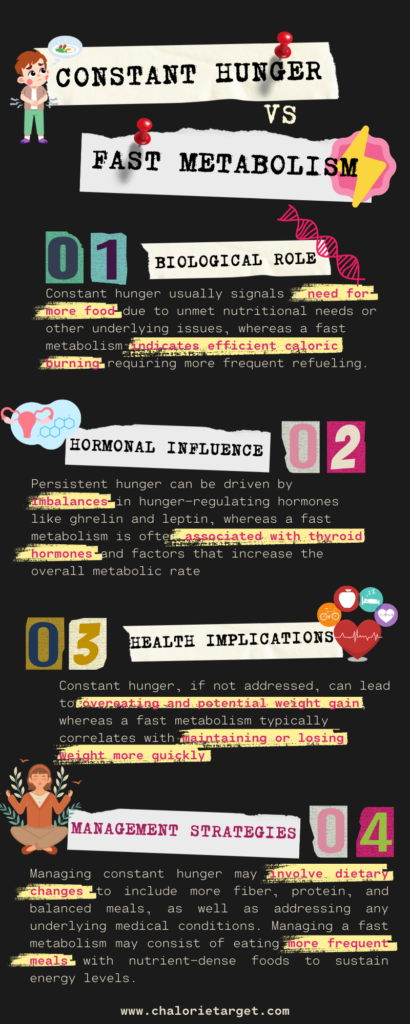Understanding hunger and appetite is crucial in seeking optimal health and nutrition. While these terms are often used interchangeably, they refer to distinct physiological and psychological phenomena.
This blog post aims to explore the difference between hunger and appetite, their significance in our daily lives and their impact on health and nutrition.
1. Understanding Hunger
a. Definition and Physiological Basis of Hunger
Hunger is a natural physiological response signaling the need for food intake. It is driven by the body’s requirements for energy and nutrients. When your body is low on fuel, it triggers the sensation of hunger to ensure you consume enough nutrients to maintain bodily functions.
b. Factors Influencing Hunger
Several factors influence hunger, including hormones and diet. Essential hormones involved in hunger regulation include:
- Ghrelin: Often referred to as the “hunger hormone,” ghrelin levels rise before meals to stimulate appetite and decrease after eating.
- Leptin: Known as the “satiety hormone,” leptin helps to regulate energy balance by inhibiting hunger when you’ve consumed enough food.
Read More: Are Liquid Calories the Same as Food Calories?
2. Decoding Appetite
a. Definition and Psychological Aspects of Appetite
Appetite, on the other hand, is the psychological desire to eat. It is influenced by external factors such as sensory cues (smell, sight, taste), emotional state, and social environment. Unlike hunger, a biological necessity, appetite can exist without physical hunger.
b. Role of Sensory Cues, Emotional State, and Social Environment
- Sensory Cues: The sight and smell of food can trigger appetite, making you crave certain foods even if you aren’t hungry.
- Emotional State: Emotions such as stress, boredom, and happiness can evoke a desire to eat. Emotional eating is a common phenomenon where individuals turn to food for comfort.
- Social Environment: Social situations, such as celebrations and gatherings, often involve food, stimulating appetite regardless of hunger.
3. Constant Hunger vs Fast Metabolism
Understanding the distinction between constant hunger and fast metabolism is essential for managing your health and nutrition.
a. Constant Hunger
Constant hunger refers to a persistent and often uncontrollable need to eat, regardless of the amount consumed. Various factors, including hormonal imbalances, nutritional deficiencies, certain medical conditions, or psychological factors, can drive it.
For instance, lacking dietary fiber and protein may increase hunger as these nutrients help promote fullness. Conditions like hyperthyroidism or diabetes can also result in persistent hunger.
b. Fast Metabolism
On the other hand, a fast metabolism refers to the body’s ability to burn calories quicker than average. Individuals with a fast metabolism may require more frequent meals to maintain their energy levels. Genetics, muscle mass, and physical activity levels primarily influence this.
c. Key Distinctions
- Biological Role: Constant hunger usually signals a need for more food due to unmet nutritional needs or other underlying issues, whereas a fast metabolism indicates efficient caloric burning requiring more frequent refueling.
- Hormonal Influence: Persistent hunger can be driven by imbalances in hunger-regulating hormones like ghrelin and leptin. Fast metabolism is often associated with thyroid hormones and factors that increase the overall metabolic rate.
- Health Implications: Constant hunger, if not addressed, can lead to overeating and potential weight gain, whereas a fast metabolism typically correlates with maintaining or losing weight more quickly.
- Management Strategies: Managing constant hunger may involve dietary changes to include more fiber, protein, and balanced meals, as well as addressing any underlying medical conditions. Managing a fast metabolism may consist of eating more frequent meals with nutrient-dense foods to sustain energy levels.
Read More: How to Stay Consistent with Working Out and Diet
4. Difference Between Hunger and Craving
Cravings are intense desires for specific foods, distinct from hunger and appetite. Unlike hunger, which arises from a need for energy and nutrients. For instance, you might crave chocolate when feeling stressed or seeking comfort, suggesting an emotional trigger.
Certain cravings can point to a lack of specific nutrients in your diet; craving salty snacks might indicate a sodium deficiency. Social and environmental factors also trigger cravings, as food advertisements or the consumption habits of those around you can stimulate specific desires.
Understanding these differences is crucial for managing your eating habits and making informed dietary choices that support your overall wellness.
5. How to Reduce Food Appetite?
Reducing food appetite involves addressing the psychological and environmental factors that drive the desire to eat, even without hunger. By understanding the triggers and cues stimulating appetite, individuals can adopt strategies to manage and even diminish unnecessary cravings.
Being mindful of emotional states and social contexts that prompt eating, such as stress or social gatherings, allows for better control over intake. Additionally, incorporating healthier habits can significantly impact appetite reduction.
a. Tips to Reduce Food Appetite
- Stay Hydrated: Drinking water before meals can help you feel fuller and reduce overall food intake.
- Eat Balanced Meals: Incorporate a balance of protein, healthy fats, and fiber into your diet to promote satiety and reduce the urge to snack.
- Practice Mindful Eating: Pay attention to your food, savor each bite, and avoid distractions like television or smartphones to improve satisfaction and control portions.
- Manage Stress: Engage in stress-relieving activities such as exercise, meditation, or hobbies to prevent emotional eating.
- Get Adequate Sleep: Poor sleep can increase hunger hormones and appetite, so aim for 7-9 hours of quality sleep per night.
6. Does Stress Reduce One’s Hunger?
Stress can have varying effects on an individual’s hunger, primarily influenced by the nature and duration of the stressor. Acute stress, often characterized by immediate threats or challenges, typically leads to a decreased appetite. This response is driven by the activation of the body’s “fight or flight” response, during which the release of adrenaline suppresses hunger.
On the other hand, chronic stress, which involves prolonged periods of tension, can have the opposite effect, increasing appetite and leading to overeating. This is due to the release of cortisol, a hormone that can enhance cravings for high-fat, high-sugar foods. Therefore, while acute stress tends to reduce hunger, chronic stress is more likely to result in increased appetite and potential weight gain.
a. Strategies for Managing Stress-Related Appetite Changes
To manage the effects of stress on appetite, it is crucial to adopt effective stress-reduction techniques. Some strategies include:
- Mindfulness and Meditation: Practices like mindfulness, meditation, and yoga can help relieve stress levels and, in turn, regulate appetite.
- Exercise: Regular physical activity can lower cortisol levels and increase endorphins, helping manage stress and appetite.
- Healthy Eating Habits: Maintaining a balanced diet rich in nutrients can help stabilize mood and prevent stress-related cravings.
- Quality Sleep: Ensuring adequate sleep supports overall health and helps maintain hormonal balance, reducing the likelihood of stress-induced appetite changes.
- Social Support: Engaging with a supportive social network can reduce stress and improve emotional well-being, positively influencing eating habits.
Read More: What Foods are High in Creatine? A Comprehensive Guide for Fitness Enthusiasts
7. Can you Train your Body Not to be Hungry?
Training your body not to be hungry involves a combination of strategic dietary choices, lifestyle changes, and psychological techniques. Start by consuming well-balanced meals rich in protein, healthy fats, and fiber, promoting longer-lasting satiety and reducing hunger.
Incorporating mindful eating practices can improve your awareness of true hunger versus emotional cravings, thereby helping to regulate your intake.
Additionally, regular physical activity helps manage stress and stabilizes blood sugar levels, which can mitigate sudden hunger. Ensuring adequate hydration is another critical factor, as thirst is often mistaken for hunger.
Finally, establishing a consistent sleep schedule is crucial, as poor sleep can disrupt hunger-regulating hormones and increase appetite. By addressing these various elements, you can effectively train your body to manage and reduce unnecessary hunger stimuli.
8. The Link to Nutrition and Health
a. How Hunger and Appetite Affect Dietary Choices
Understanding hunger and appetite is essential for making informed dietary choices. While hunger prompts you to eat to fulfill nutritional needs, appetite can lead to eating for pleasure or other non-nutritional reasons. This distinction is critical for weight management and overall health.
b. Implications for Weight Management and Overall Health
- Weight Management: Differentiating between hunger and appetite can help prevent overeating and support weight management. Recognizing accurate hunger signals allows you to eat in response to your body’s needs rather than external cues.
- Overall Health: Balancing hunger and appetite is crucial for maintaining a healthy diet. Overeating due to appetite-driven impulses can lead to excessive calorie intake and poor nutritional choices, impacting long-term health.
9. Strategies for Managing Hunger and Appetite
a. Tips for Controlling Hunger
- Eat Nutrient-Dense Foods: Incorporate foods rich in protein and fiber, such as lean meats, legumes, whole grains, and vegetables, to promote satiety.
- Regular Meal Timing: Eating at regular intervals helps maintain stable blood sugar levels and prevents extreme hunger.
b. Behavioral Strategies to Regulate Appetite
- Mindful Eating: Pay attention to your body’s hunger signals and eat slowly to recognize when you are full.
- Avoid Emotional Eating: Find alternative ways to cope with emotions, such as exercise, meditation, or hobbies.
- Create a Healthy Food Environment: Keep unhealthy snacks out of sight and stock up on nutritious options to reduce temptation.
10. Conclusion
Understanding the difference between hunger and appetite is essential for making informed choices about our health and well-being. Hunger is a physiological need while appetite is a psychological desire for food, often influenced by external factors such as emotions, environment, and social situations.
Recognizing these distinctions helps in developing healthier eating habits, allowing us to respond appropriately to our body’s genuine needs rather than succumbing to cravings or external temptations.

